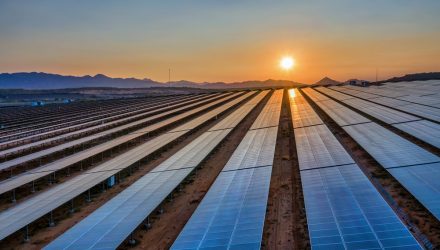Solar sector-specific exchange traded fund shined through a cloudy Tuesday after U.S. home solar installer Sunrun (NasdaqGS: RUN) announced it will acquire Blackstone-backed peer Vivint Solar (NYSE: VSLR).
The Invesco Solar ETF (NYSEArca: TAN) was among the best performing non-leveraged ETFs of Tuesday, rising 1.6%.
Meanwhile, Sunrun shares jumped 23.5% and Vivint shares surged 37.7% on Tuesday. TAN includes a 5.3% tilt toward RUN and 3.1% weight in VSLR.
The two largest U.S. rooftop solar companies are merging after Sunrun bought out Vivint Solar in an all-stock deal for $1.6 billion, the Wall Street Journal reports.
The consolidated consumer solar installer may have a more solid footing as analysts forecast diminished growth for years due to the coronavirus outbreak. The companies argued that the merger will allow them to cut operating costs and leverage complementary sales strategies.
“It felt like now was a perfect time because we have been through the Covid test,” Sunrun Chief Executive Lynn Jurich, who will lead the combined firm, told WSJ. “Both companies are emerging stronger from this transition.”
The second quarter was expected to have been one of the industry’s worst in years after panel installers struggled with restrictions on making sales in person, along with delays in permits and installations due to the lockdowns. Looking ahead, the slowdown is expected to continue as Covid-19 cases rise in many sunny states.
“We are performing above our prior expectations,” Vivint CEO David Bywater, who is expected to join the Sunrun board, told the WSJ. “We have innovated, adjusted, and quickly learned how to serve our customers by providing a contactless selling and installation experience.”
Before the pandemic, energy consulting firm Wood Mackenzie projected U.S. residential solar companies to add 3,089 megawatts of capacity this year, or up 9% from 2019. However, it has since cut forecasts to 2,118 megawatts.
“The timing couldn’t have been worse for the residential segment,” Wood Mackenzie’s global solar head, Ravi Manghani told the WSJ. “It is basically setting the industry back by two or three years.”
For more information on the renewables space, visit our renewable energy category.








